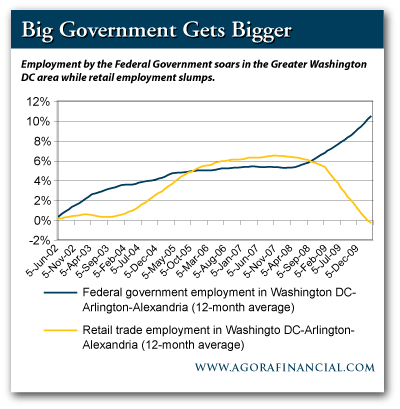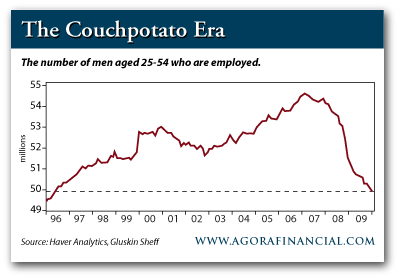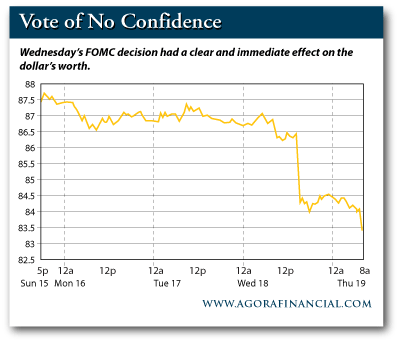In a research note entitled, "Return to Normalcy," John Silvia, Chief Economist at Wachovia, gushes, "With the war against the Great Recession over, our newly reappointed head of the Federal Reserve now seeks to take us back to normalcy in the financial markets. Let's trust that he too ushers in a decade of prosperity.
"After World War I," Silvia explains, "American voters longed for a return to normalcy and elected Warren Harding, whose administration began a decade of economic growth. For Ben Bernanke, the return to normalcy we expect will lead to at least two years of economic expansion but with some volatility along the way."
Okay, so two years is not quite the same thing as ten years. But at this point, most Americans would settle for two months of "normalcy."
"Two important indicators – industrial production and leading indicators index – suggest continued economic growth," says Silvia, explaining his optimism, "Industrial production registered its seventh straight increase and these data suggest the economic recovery began in the second quarter of 2009."
Upbeat macro-economic projections from the likes of John Silvia illustrate that economics is less a "dismal science" than a "faux science" – guided by prejudice and misguided by personal experience.
Of course the economists on Wall Street believe the recession has ended. Why wouldn't they? Former Treasury Secretary, Hank Paulson, shipped enough taxpayer money to Lower Manhattan in 2008 to employ every Wall Street economist for life...along with every Wall Street CEO, proprietary trader, managing director, vice-president, secretary, security guard, lunch-runner, limo driver and yoga instructor.
Similarly, the economists in Washington have absolutely no reason to doubt that the recession has ended...because the recession never arrived in Washington in the first place! Government employment in the Greater Washington DC region has jumped more than 10% during the last eight years, while retail employment has gone nowhere. And this divergence has accelerated as the recession has deepened!

Unfortunately, the employment trends depicted in the nearby chart are not the trends that typically produce national prosperity. If government employment were to continue rising while private sector employment fell, the economy would become less productive...at least that would be our guess. (Picture the post office operating every McDonald's in the land).
Thus, the recession may be ending for Wall Street economists and government workers, but not for anyone else. Adult male workers, to name just one conspicuously under-employed group of Americans, are hurting big-time...

"Male employment (aged 25 to 54 years old) plunged 114,000 in January and is back to levels last seen in June 1996," observes David A. Rosenberg, an economist who toils neither for Wall Street nor Washington. "Almost 10% of what was once considered the 'breadwinner' part of the workforce has been extinguished during this recession. How could anyone realistically be excited about recovery prospects knowing this?"
Furthermore, Rosenberg notes, "the average duration of unemployment rose to a record 30.2 weeks from 29.1 weeks in December; and for the first time ever, we have more than 6.3 million Americans (up from 6.1 million in December) who have been looking for a job with no luck for at least six months. That is an unprecedented 41.2% share of the pool of unemployment... The level of unemployment today, at 129.5 million, is the exact same level it was in 1999."
Not surprisingly, therefore, your average American laborer is noticeably less optimistic than your average Wall Street economist. The Conference Board's Consumer Confidence Index plummeted from 56.5 in January to 46 this month. Even more telling, the "present conditions" component of the index dropped more than 20% from January, to its lowest reading since 1983. At the same time, the "business is good" component of the index dropped to its lowest reading in the 43-year history of the Consumer Confidence Index.

If these are the signs of recovery, it is a very strange recovery indeed top stocks for 2010.
No comments:
Post a Comment